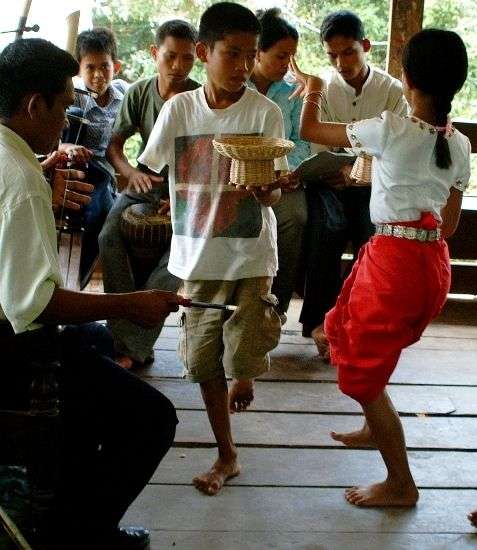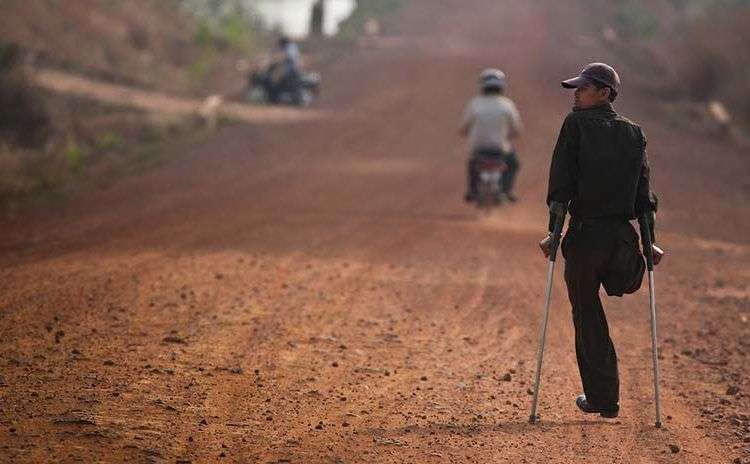-¡But must we go on walking with all this baggage? said the American writer and filmmaker Alison McMahan. Cameras and supplies were rented and costly. A path of oxen appeared before them and about two kilometres were missing to reach the place in Cambodia.
‘What a weak Americans! It was the response from the villagers. And then they cut a long bamboo stick and hung everything. The team had arrived from the United States and … they went into life after the horror.
Veal Thom is a lost site of Southeast Asia where people who have lost their limbs work and live, with their family. Some are survivors of the genocide of Pol Pot, regime that exterminated more than two million human beings between 1975-1979. Others are children, victims of a soil full of mines after years of war.
A terrible picture appears, but the film is mainly a celebration of will. No matter where a well told human story always shocks.
I am in a seat of Cuba cinema watching the work Bare hands and Wooden limbs. Alison McMahan, its director, won the award for best direction (short film category) at the 14th Santiago Alvarez in Memoriam International Documentary Festival, recently developed in Santiago de Cuba.
Already exhibited in the United States and Europe, the attendees have experienced a privilege. Unfortunately, it addresses an issue without any expiration: that of the war, the mines, and innocent victims.
I write down a phrase in my notebook. It drills as sharp letter: “Landmines are perfect soldiers, never sleep and never die, but also do not know which party to support, or when the war is over.”
Bare hands and wooden limbs

A girl bows her hand, the only one. A boy stands with his empty sleeve. Another one sounds a pair of tiny discs with his stumps.
A villager goes every day to the jungle, with no instrument, as an internal command. And each time he takes a mine out of that field of death. He has even mounted a “museum” with all that metal evil.
A legless man moves through between the bushes. A small hand drags a wooden toy, made almost without hands.
Two former commanders of the Khmer Rouge and the Chem Sip, once persecuted and tortured, drink tea. What furrows have life marked behind those faces? Years ago they were enemies, but now work together to make the community possible.
There are barely tears in Bare hands and wooden limbs. It is a dull pain, sheltered in the deepest. However, when talking to the director, the excitement emerges. She and her small team went to Cambodia summoned by an NGO, to support them in training in the use of prostheses; but they found more than that. And at the end they spent about six weeks, in three different visits.
“We shot hours and hours of film with many witnesses. Then we had to wait a while to get back on the stories with those same people. We also had to locate pictures of files from that holocaust in Cambodia, to situate the American public and everyone who had access to the material.
“We face a stressful reality, very unique beliefs about dead people -almost oppressive, impressive stories; but I did not want a tear film, because among those people I found a lot of courage.”
Alison says she owes much to the editor Kathryn Barnier in the synthesis and assembly of all the footage, and of course, the cameraman Mathieu Roberts; but she adds: “We did not invent anything, just give witness of what we saw.”
“I took great lessons of the realization of this documentary. When I went home with all this reality in tow, I realized that the hardest thing that happened in my life is nothing compared to what I saw. I have no right to complain. I have been a teacher and teach people that sometimes complain about obstacles … then I show them the documentary for them to see what it’s really hard.
“I have also thought that two people can be enemies, and although it is difficult to forget or forgive; they can always have a space for life, a future can always be created.”
Veal Thom is an utopia, a mirror, a song, a tear.
The New Yorker McMahan has just finished her novel The Saffron Crocus, which stage is a quasi-police story in the Venice of 1643. Now she is committed to the process of her upcoming documentary: The Eight Faces of Jane, about the life and work of Jane Chambers, playwright and lesbian whose work claimed the right to love, regardless of sexual preference.
When I put an end to our conversation, my mind is flooded with the poem by Miguel Hernández, with music by the Catalan Joan Manuel Serrat: “I bleed, fight, live for freedom… / Because I am like the felled tree that sprouts / because I still have life.”










